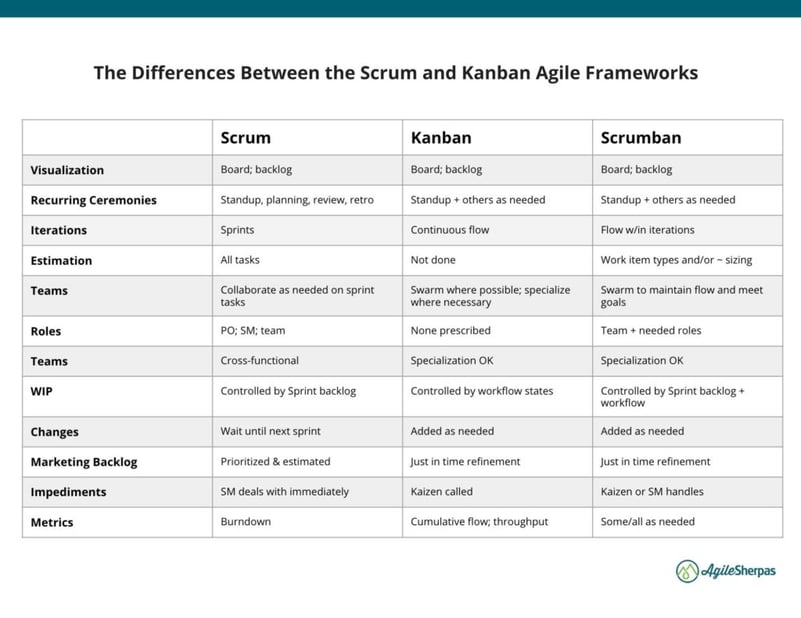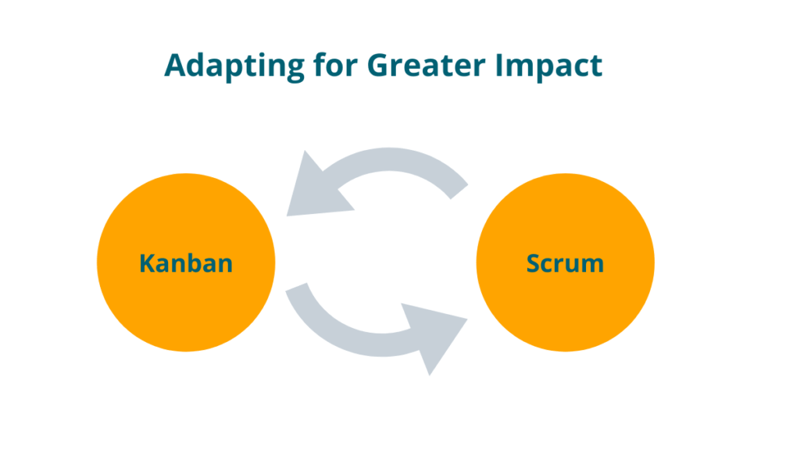-
- marketing agility
- Teams
- Organizations
- Education
- enterprise
- Articles
- Individuals
- Transformation
- Solution
- Leadership
- Getting Started
- business agility
- agile management
- going agile
- Frameworks
- agile mindset
- Agile Marketing Tools
- agile marketing journey
- organizational alignment
- Agile Marketers
- People
- Selection
- (Featured Posts)
- strategy
- agile journey
- Kanban
- Metrics and Data
- Resources
- Why Agile Marketing
- agile project management
- self-managing team
- Meetings
- Scrum
- agile adoption
- scaled agile marketing
- tactics
- scaled agile
- AI
- Agile Leadership
- Agile Meetings
- agile marketing training
- agile takeaways
- agile coach
- enterprise marketing agility
- Scrumban
- state of agile marketing
- team empowerment
- Intermediate
- agile marketing mindset
- agile marketing planning
- agile plan
- Individual
- Team
- Videos
- agile marketing
- agile transformation
- kanban board
- Agile Marketing Terms
- traditional marketing
- Agile Marketing Glossary
- FAQ
- agile marketing methodologies
- agile teams
- CoE
- Scrumban
- agile
- agile marketer
- agile marketing case study
- agile marketing coaching
- agile marketing leaders
- agile marketing metrics
- agile pilot
- agile sales
- agile team
- agile work breakdown
- cycle time
- employee satisfaction
- marketing value stream
- marketing-analytics
- remote teams
- sprints
- throughput
- work breakdown structure
- Agile Marketing Teams
- News
- agile brand
- agile marketing books
- agile marketing pilot
- agile marketing transformation
- agile review process
- agile team charter
- cost of delay
- hybrid framework
- pdca
- remote working
- scrum master
- stable agile teams
- stand ups
- startups
- team charter
- team morale
- user story
- value stream mapping
- visual workflow

Managing a marketing department efficiently isn't easy, еspecially at scale. Different team functions, task types, and dependencies on other departments make finding the right recipe for process success a challenge.
In other professional areas, like software development and customer support, applying the most popular Agile frameworks, Kanban and Scrum, in their pure form is the perfect path towards agility.
In a marketing context, even more regulated ones like HLS or BFSI marketing, sticking with a single Agile methodology may not be an option. The nature of the projects and how they break down in the marketing department tends to break these "off the shelf" approaches.
Teams operating in the marketing context have come to the conclusion that they require a tailored approach to applying Agile in order to become truly efficient.
The 7rd Annual State of Agile Marketing Report showed that 25% of marketers choose to customize a hybrid approach to Agile marketing for their implementation. Here's why almost half of marketers choose to tailor their Agile framework to fit their context, instead of following Scrum or Kanban by the book.
What is a Hybrid Agile Approach?
As the name suggests, a Hybrid approach to Agile marketing is one that combines practices from two or more methodologies. The goal of implementing a hybrid approach is to select the practices that fit in your context from proven Agile marketing methodologies, like Kanban and Scrum, and implement only the practices that provide solutions to your particular process challenges.

The great thing about Agile is that many practices and tools from different methodologies complement each other and can easily be combined for best results.
For example, even if your marketing team does not apply the practice of timeboxing from Scrum (also known as sprints), it can still continue hosting ceremonies that originate from Scrum, like the retrospective, review, and planning.
This allows teams to focus more on the practical aspects of achieving agility, instead of navigating prescriptive methodologies. As a result, they can find what works best without becoming burdened by practices and rituals that bring no extra value to their daily work.
Top Reasons for Adopting a Hybrid Approach to Agile Marketing
The 7th Annual State of Agile Marketing Report gathered insights from 350+ marketing leaders. Those who shared that they are applying a hybrid approach pointed out several reasons for choosing this course of action.
1. Having unique activities that don’t fit within a single Agile methodology
The original Agile practices, derived from the Agile Manifesto published in 2001, were initially developed for the first digital profession -- software development. Naturally, the Agile methodologies that marketers are now encountering were built with the needs of engineers in mind.
Considering the vast differences in process and workflow between software development and marketing, it doesn’t come as a surprise that marketers are having a hard time using Scrum, Kanban, or Lean in their purest forms.
In fact, 50% of the teams applying a hybrid approach to Agile marketing say that they have unique activities that don't fit with traditional Agile approaches and require a more customized approach.
2. Adapting Agile methodologies for greater impact
The second most frequently mentioned reason is related to the desire to make the most of Agile while taking the best practices from each methodology. Forty-three percent of the teams practicing a hybrid approach actually discovered they were able to achieve greater impact with their Agile implementation if they incorporated practices from Scum and Kanban, instead of when they were forced to choose just one.

Achieving marketing agility and maintaining continuous process improvement requires a lot of experimentation. Having the freedom to define what works for you and what doesn't is all a part of your team's empowerment. Some Agile practices will face internal resistance; others won't work in a marketing team as well as they might in a product team.
Testing and tailoring to arrive at a hybrid process model that work for your team may not be the easiest path, but it is the one that is more likely to lead marketers to lasting agility.
3. Participating in company-wide Agile transformation
Another common factor for choosing a hybrid combination of multiple Agile marketing methodologies is as simple as "everyone else is doing it"!
According to 24% of the marketers applying a hybrid Agile approach, it was necessary to adapt their implementation in order to collaborate effectively with other departments.
Due to the differences between the process structure of teams practicing varying manifestations of Agile marketing methodologies in their pure forms, it can sometimes be necessary to compromise.
Let’s illustrate the potential collaboration problems when the marketing team is practicing Scrum and works in time-boxed sprints, while the sales team applies Kanban and has a continuous workflow.
At the beginning of their two-week sprint, the marketing team has spent half a day carefully planning their sprint backlog and estimating the required effort to successfully complete their tasks on time. On the other side of the office, the sales team has a long backlog of leads that are being pulled into their workflow when the WIP limit allows it.
While doing so, an opportunity appears that requires urgent assistance from the marketing team. In this case, the Scrum marketers have a couple of options:
- Cancel the sprint and start a new planning session immediately so they can adapt to the new situation
- Tell the sales team that they can’t help them before the next sprint
- Take on the new task and jeopardize other work that they have committed to in their sprint
Whichever they choose, there's a major disruption for one of the teams. This creates tension between them and may lead to further collaboration problems in the future.
If there’s no way to apply pure Scrum or Kanban to all departments, company leaders are likely to encourage teams to work based on a hybrid approach.
Before proceeding to learn the next reason, why don't you take a second to get our guide on choosing an Agile trailhead?
4. Adapting Agile to their organization’s culture
To ensure that Agile propagates within the organization, it should be able to survive within the organizational culture. Culture doesn’t change overnight, and gradually weaving in Agile practices over time can be a better long-term strategy than turning established processes on their head.
Twenty percent of the marketing teams are using hybrid Agile marketing methodologies to blend agility with existing cultural norms.

Although Agile is not new, the principles and practices associated with it still seem foreign to more traditional organizations. Some practices might meet resistance from both individual contributors and managers alike.
For example, limiting work in progress is a Kanban practice that has proven to bring enormous boosts to team productivity. Yet, it seems counterintuitive to the majority of people who are just getting acquainted with Agile methodologies.
As a result, even if the marketing team is diligent in complying with the limit, other non-Agile teams won’t necessarily respect it. This makes it difficult for the team to say “not right now” in order to keep control over their queue of work.
Hybrid methodologies are a good way to ease into Agile ways of working instead of being too prescriptive.
5. Being part of a highly-regulated industry
According to 19% of teams, choosing a hybrid approach relates to their organization's position in a highly-regulated industry.

Unfortunately, in some cases, sticking to a single methodology is not possible, even if there’s complete organizational support for that. For example, companies operating in highly-regulated industries such as financial services or healthcare must adhere strictly to established standards.
As a result, practices such as short sprints, reviews with many stakeholders at once, and very frequent delivery to the end customer might not be in keeping with the environment. These situations make it necessary to look for alternative approaches to implementing agility, while taking into account industry rules.
6. Lack of appropriate staff
The last reason on the list for choosing a hybrid approach to Agile marketing is that organizations don’t have employees with the right skills to follow a pure Agile framework.
This caused 15% of the marketers to seek a hybrid approach.
The most typical adaptation for non-IT companies is the removal of the dedicated Scrum master. Although the role is invaluable for Scrum teams, some leaders are reluctant to hire a full time process owner. As a result, they either go without one or appoint the role to a member of the current team. This team member is tasked with facilitating process, while also contributing to team execution within the workflow.
Also, marketing team leads often can’t afford to step away from execution entirely. That is why they continue to contribute to tasks while playing the Marketing Owner role.
Further, marketing departments, more than other teams in the business, tend to rely on remote employees in different time zones. This makes it difficult to do standup meetings by the book. That is why some team host an AM and PM standup to make sure everyone continues to stay in the loop.
Choosing Your Hybrid Approach
If you relate to these reasons for choosing a hybrid approach to Agile, consider mixing things up yourself. A good starting point would be to look into Scrumban, which is by far the most popular hybrid between Agile methodologies.
One of the best investments you could make as an Agile marketer is continuing to explore the vast universe of Agile practices. This will help you fully understand what each methodology can offer and make informed decisions about your process experiments.
And, if you need guidance for tailoring your unique hybrid, just ask a Sherpa.
Before moving on, don't forget to get your copy of our Choosing an Agile Trailhead Guide.
Topics discussed
Improve your Marketing Ops every week
Subscribe to our blog to get insights sent directly to your inbox.



